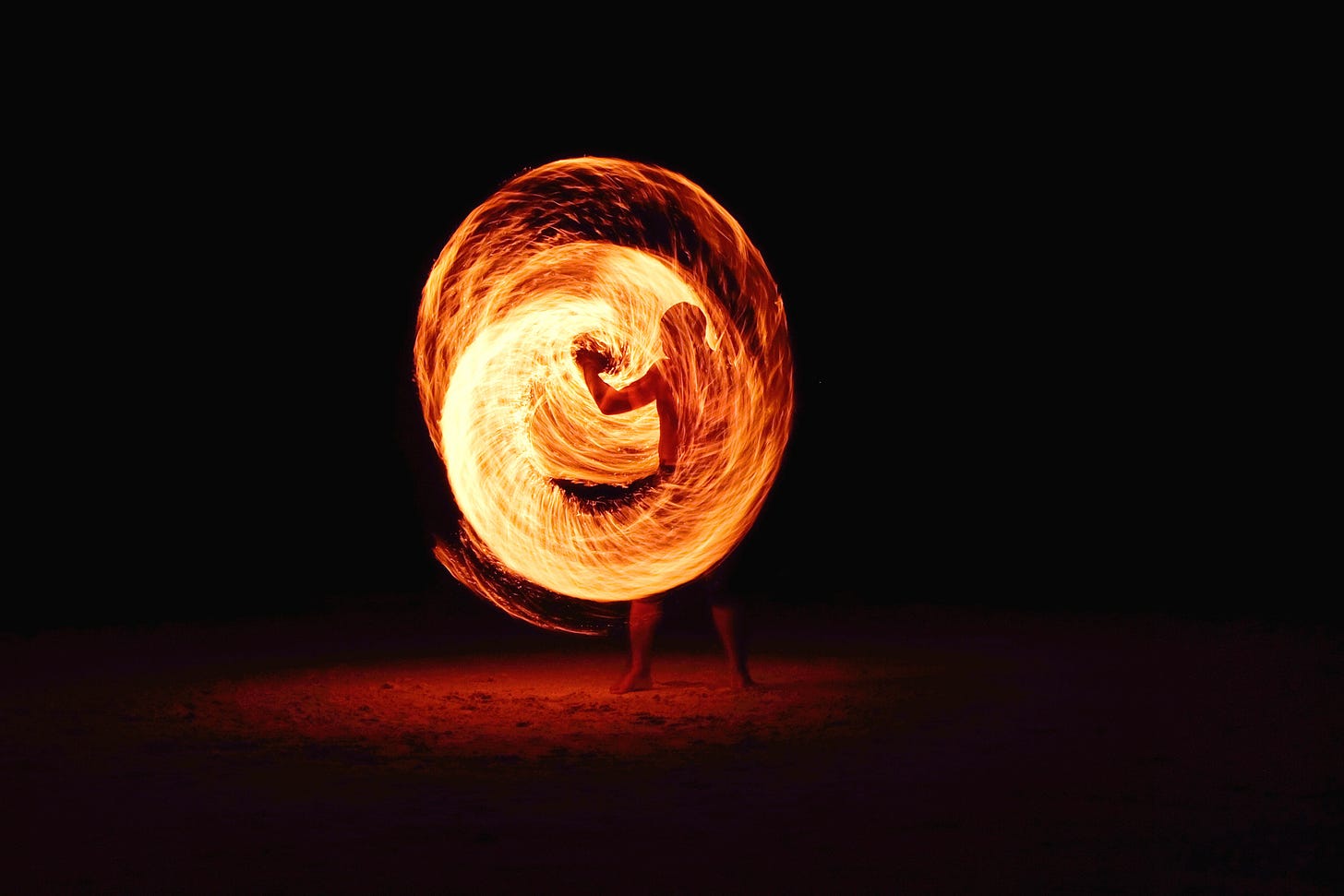[From the Archives] The Most Important Human Discovery of All Time—Fire
The discovery and mastery of fire is, without a doubt, the most consequential event in human history and evolution.

Greetings, fellow wanderers,
Today I am republishing another post from the archives. As Those Who Wander approaches 800 subscribers, I am grappling with the fact that most new subscribers may not have access to or be familiar with some of my initial writings. With over 100 posts in the archive, I want to expose these paywalled posts to newcomers.
If you have been enjoying these ramblings on travel, adventure, and anthropology, please consider supporting my writing, which grants you full access to everything I’ve written on Substack, including excerpts from my upcoming book. In addition, the proceeds will go toward publishing and promoting my forthcoming book, ‘An Anthropology of Wandering: How Adventure Can Alleviate a Fearful Culture’. The book is a first-person account of backpacking the Appalachian Trail that dives into anthropology, travel, fear, and the meaning of adventure in culture and society. If you love social science, adventure, and travel, this book will be for you. Subscribe and stay tuned for more updates.
Subscribed
Lastly, Substack recently enabled an exciting new feature on their app—text-to-speech for all your favorite posts! You can now listen to anything published at Those Who Wander just like a podcast. And it’s incredibly simple:
Navigate to the post you want to listen to.
Click the play button in the upper right-hand corner of the screen.
Voilà!
Thank you to everyone who has subscribed and supported my work thus far. Cheers! -JSB
Now onto today’s archived post, The Most Important Human Discovery of All Time—Fire
“I believe the transformative moment that gave rise to the genus Homo, one of the great transitions in the history of life, stemmed from the control of fire and the advent of cooked meals.”
-Richard W. Wrangham, Catching Fire: How Cooking Made Us Human
Many technophiles and historians love to debate what the most important human invention or discovery was. In recent years, we’ve been hyper-focused on the computer, the internet, smartphones, and artificial intelligence. In the first half of the 20th century, major discoveries about the universe and quantum mechanics expanded our worldviews of the macro and micro worlds, and the development of the atom bomb seemed to usher in an age of imminent global destruction. The invention of Penicillin and pasteurization have likely saved millions, perhaps billions of lives by now.
We’ve even labeled entire eras of invention and discovery, like the Agricultural Revolution and Industrial Revolution, as having the largest impact on society and culture. But for an anthropologist like me, the sine qua non of all inventions was the discovery of fire. The discovery and mastery of fire is, without a doubt, the most consequential event in human history and evolution. Without the control of fire, no other invention would have been born, and humans would have either looked very different on this planet than they do today or may very well have become extinct many millennia ago. Here’s why.
Fire is multifaceted. Like a Swiss army knife, it does many things but is far more useful than a toothpick or can opener. Fire not only cooks food, making it taste better, but also kills harmful microbes that might have otherwise made many more of us sick and caused our deaths. Fire scares away predators, something we no longer appeal to for safety all that often, but was extraordinarily vital to our ancestors who lived in a far harsher world with many more predators to contend with. We know early humans were hunted by big game in Africa because we’ve found their skulls punctured by the fangs of giant sabertoothed cats.
We were also able to use fire to chemically alter the structure of stone to harden hunting spears and transform otherwise brittle stones into material that could be used to make blades for cutting and points for weapons. Eventually, we learned that fire could be used to harden clay into vessels, bowls, and various sorts of useful containers for food and drinks. Being able to store food in containers away from rodents and insects is HUGE because storage is a very underappreciated risk mitigation strategy. Fire kept these pesky critters, like mice that carried disease, at a distance, and fires kept us warm and comfortable through long ice ages, perhaps staving off hypothermia for even more of us to survive the long, brutal winters.
But I believe that of all the downstream effects of humans learning to control fire, one of the most deeply significant things fire did for us was brighten up the night. The consequence of staying up at night around the fire, socializing, telling stories, and planning out the following days had enormous psychological and social effects on our evolution.
What I love about fire is sitting around one on an early fall evening with friends. After a while, when the conversation ceases for a time, everyone’s gaze is pulled into the fire. We enter a relaxed, hypnotic state. That’s an incredibly magical moment to me because I suspect that is when a lot of us do our best introspective “deep” thinking. Think of how many hours early humans spent wondering in those flames. What do you suppose they thought about across hundreds of thousands of years?
I don’t think it is a coincidence either that the first human ancestor to wander outside of Africa, that being Homo erectus, is also the first hominin suspected of using and controlling fire sometime between 1-2 million years ago. With the capacity to either build a fire anew or carry smoldering embers in a bundle of leaves and twigs over long distances and reconstruct fire when needed, early humans stood a far better chance of survival and could now more comfortably venture to greater distances.
Once we could control fire, the lights went on inside the early hominin mind. Fire may literally have ignited a chain reaction in the early human mind that eventually enabled humans to become a global species. How profound is that?
Although history is still being made and we can never fully know the impact of past or future inventions and discoveries on humanity, fire is undoubtedly what started everything! We can trace every single invention we take for granted today all the way back to the human discovery and mastery of fire.
Thanks for being a fellow traveler with me through this read. Please consider subscribing, sharing, and supporting this project. Much more to follow.
Cheers!
-JSB




